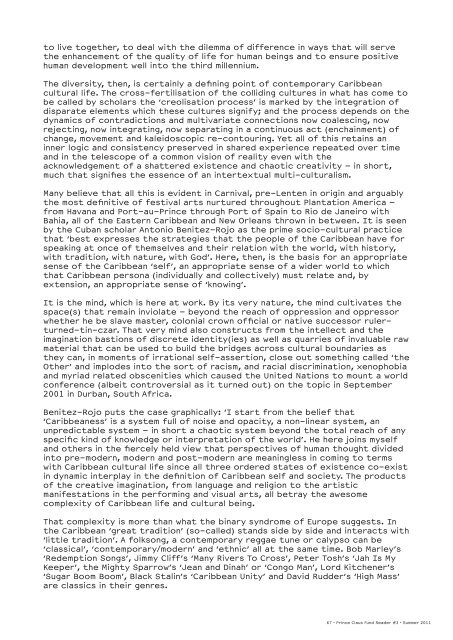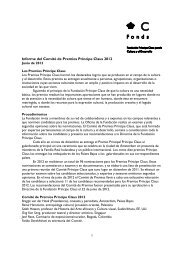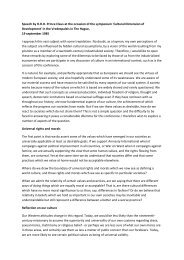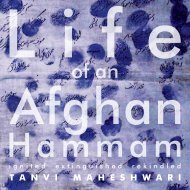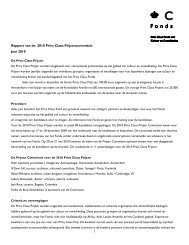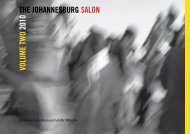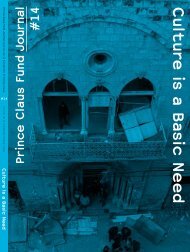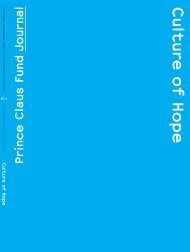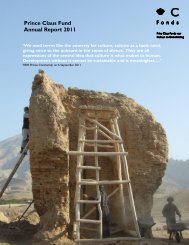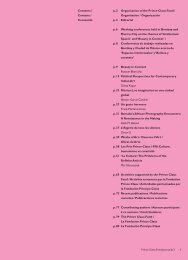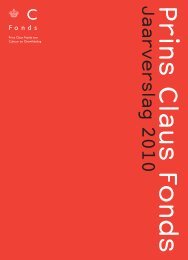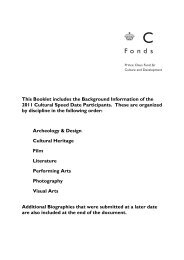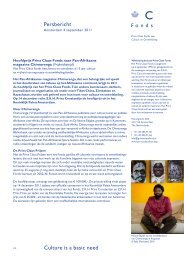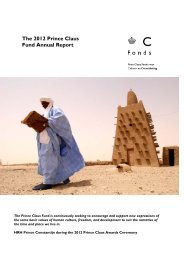3 summer 2011 - Prince Claus Fund
3 summer 2011 - Prince Claus Fund
3 summer 2011 - Prince Claus Fund
- No tags were found...
Create successful ePaper yourself
Turn your PDF publications into a flip-book with our unique Google optimized e-Paper software.
to live together, to deal with the dilemma of difference in ways that will servethe enhancement of the quality of life for human beings and to ensure positivehuman development well into the third millennium.The diversity, then, is certainly a defining point of contemporary Caribbeancultural life. The cross-fertilisation of the colliding cultures in what has come tobe called by scholars the ‘creolisation process’ is marked by the integration ofdisparate elements which these cultures signify; and the process depends on thedynamics of contradictions and multivariate connections now coalescing, nowrejecting, now integrating, now separating in a continuous act (enchainment) ofchange, movement and kaleidoscopic re-contouring. Yet all of this retains aninner logic and consistency preserved in shared experience repeated over timeand in the telescope of a common vision of reality even with theacknowledgement of a shattered existence and chaotic creativity – in short,much that signifies the essence of an intertextual multi-culturalism.Many believe that all this is evident in Carnival, pre-Lenten in origin and arguablythe most definitive of festival arts nurtured throughout Plantation America –from Havana and Port-au-<strong>Prince</strong> through Port of Spain to Rio de Janeiro withBahia, all of the Eastern Caribbean and New Orleans thrown in between. It is seenby the Cuban scholar Antonio Benitez-Rojo as the prime socio-cultural practicethat ‘best expresses the strategies that the people of the Caribbean have forspeaking at once of themselves and their relation with the world, with history,with tradition, with nature, with God’. Here, then, is the basis for an appropriatesense of the Caribbean ‘self’, an appropriate sense of a wider world to whichthat Caribbean persona (individually and collectively) must relate and, byextension, an appropriate sense of ‘knowing’.It is the mind, which is here at work. By its very nature, the mind cultivates thespace(s) that remain inviolate – beyond the reach of oppression and oppressorwhether he be slave master, colonial crown official or native successor rulerturned-tin-czar.That very mind also constructs from the intellect and theimagination bastions of discrete identity(ies) as well as quarries of invaluable rawmaterial that can be used to build the bridges across cultural boundaries asthey can, in moments of irrational self-assertion, close out something called ‘theOther’ and implodes into the sort of racism, and racial discrimination, xenophobiaand myriad related obscenities which caused the United Nations to mount a worldconference (albeit controversial as it turned out) on the topic in September2001 in Durban, South Africa.Benitez-Rojo puts the case graphically: ‘I start from the belief that‘Caribbeaness’ is a system full of noise and opacity, a non-linear system, anunpredictable system – in short a chaotic system beyond the total reach of anyspecific kind of knowledge or interpretation of the world’. He here joins myselfand others in the fiercely held view that perspectives of human thought dividedinto pre-modern, modern and post-modern are meaningless in coming to termswith Caribbean cultural life since all three ordered states of existence co-existin dynamic interplay in the definition of Caribbean self and society. The productsof the creative imagination, from language and religion to the artisticmanifestations in the performing and visual arts, all betray the awesomecomplexity of Caribbean life and cultural being.That complexity is more than what the binary syndrome of Europe suggests. Inthe Caribbean ‘great tradition’ (so-called) stands side by side and interacts with‘little tradition’. A folksong, a contemporary reggae tune or calypso can be‘classical’, ‘contemporary/modern’ and ‘ethnic’ all at the same time. Bob Marley’s‘Redemption Songs’, Jimmy Cliff’s ‘Many Rivers To Cross’, Peter Tosh’s ‘Jah Is MyKeeper’, the Mighty Sparrow’s ‘Jean and Dinah’ or ‘Congo Man’, Lord Kitchener’s‘Sugar Boom Boom’, Black Stalin’s ‘Caribbean Unity’ and David Rudder’s ‘High Mass’are classics in their genres.67 · <strong>Prince</strong> <strong>Claus</strong> <strong>Fund</strong> Reader #3 · Summer <strong>2011</strong>


